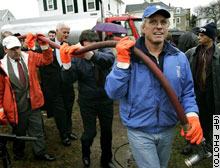Untitled Document
 |
Joseph P. Kennedy II of
Citizens Energy Corp. and other officials deliver oil Tuesday to Quincy
residents. |
Thousands of low-income Massachusetts residents will receive discounted
home heating oil this winter under an agreement signed Tuesday with Venezuela,
whose government is a political adversary of the Bush administration.
Citgo Petroleum Corp., a subsidiary of Venezuela's state-owned oil company,
will supply oil at 40 percent below market prices.
It will be distributed by two nonprofit organizations, Citizens Energy Corp.
and the Massachusetts Energy Consumers Alliance.
The agreement gives President Hugo Chavez's government standing as a provider
of heating assistance to poor U.S. residents at a time when U.S. oil companies
have been reluctant to do so and Congress has failed to expand aid in response
to rising oil prices.
U.S. Rep. William Delahunt of Massachusetts, a Democrat, met with Chavez in
August and helped broker the deal.
He said his constituents' needs for heating assistance trump any political
points the Chavez administration can score.
"This is a humanitarian gesture," Delahunt said, speaking after a
news conference with Venezuelan officials and others outside the home of a constituent
in Quincy who will receive heating aid.
Citgo is the Houston, Texas-based subsidiary of Venezuela's state-owned oil
company and has about 13,500 independently owned U.S. gas stations.
It is offering Massachusetts more than 12 million gallons of discounted heating
oil over the next four months, starting in December.
The two nonprofit organizations will screen recipients for financial need and
cooperate with oil distributors that will make discounted deliveries to qualifying
homes and institutions, such as homeless shelters and hospitals.
Chavez proposed offering fuel directly to poor U.S. communities during a visit
to Cuba in August.
He has said the aim is to bypass middlemen to reduce costs for the American
poor -- a group he argues has been severely neglected by Bush's government.
Chavez has become one of Latin America's most vocal critics of U.S.-style capitalism,
which he calls a major cause of poverty.
U.S. officials accuse Chavez of endangering Venezuelan democracy by assuming
ever greater powers.
During a short-lived 2002 coup against Chavez, the U.S. government promptly
recognized the new leaders, who were soon driven out amid a popular uprising.

